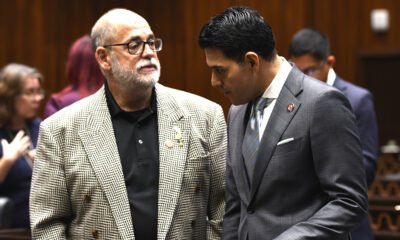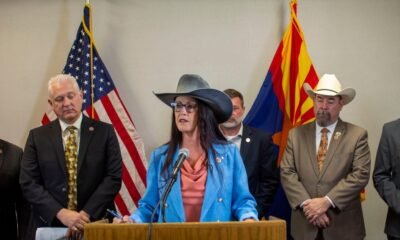abortion
Hobbs Under Fire for Allegations of Disinformation on Prop 139

By Matthew Holloway |
Governor Katie Hobbs of Arizona has emphasized that the proposed Prop 139 amendment to the state’s Constitution, which asserts that “Every individual has a fundamental right to abortion,” would not extend to minors. In contrast, opponents of the proposition, including Cindy Dahlgren from the Center for Arizona Policy Action, argue that the term “individual” inherently includes minors. Dahlgren expressed her concerns, stating, “It would clearly be argued that ‘every individual’ includes minors.”
The proposed amendment outlines restrictions the state cannot impose on abortion rights. It explicitly prohibits any laws that deny, restrict, or interfere with the right to abortion before fetal viability, unless justified by compelling state interest. Furthermore, after viability, the amendment protects access based on a healthcare professional’s judgment regarding the individual’s health.
The legal interpretation of the term “individual” plays a crucial role in this debate. Arizona law describes an “individual” as a resident with a principal mailing address in the state, which applies to both minors and adults. According to family law, the definition encompasses anyone under the age of majority, which raises significant implications for the proposed amendment.
The Arizona Capitol Times reported Hobbs suggesting that if Prop 139 were to invalidate parental consent requirements, minors would still be required to seek such consent to obtain an abortion. “Health care providers would be subject to the same provisions relating to minors as they are under any other circumstance,” she stated.
However, state law currently indicates otherwise. Arizona law clearly states that a minor can receive medical care without parental consent. This contradiction highlights the complexities that might arise if the amendment passes.
Attorney General Kris Mayes, another proponent of Prop 139, indicated that legal challenges are likely if the amendment is approved. “If Prop 139 passes, my office will conduct an analysis on its impact to other statutes,” Mayes noted, acknowledging the potential for court involvement in interpreting the amendment’s implications.
There is also a legal pathway for minors to seek an abortion without parental consent if they can demonstrate sufficient maturity to make informed decisions. While minors account for only a minority of abortions performed in Arizona, this issue remains significant—12% of abortions performed in 2022 involved minors.
Attorney Andrew Gaona from Arizona for Abortion Access explained that the passage of Prop 139 would establish a fundamental right to abortion and set standards for existing laws governing abortion practices. He cautioned that the amendment’s relationship with current statutes concerning minors remains unclear and open to judicial interpretation.
Bethany Miller, a representative of the Center for Arizona Policy, highlighted differences between Prop 139 and other rights amendments. She noted, “The Arizona right to bear arms is not ‘fundamental,’” referencing a ruling that characterized gun rights as qualified. In contrast, she warned that the language in Prop 139 suggests a near absolute right regarding abortion access.
Matthew Holloway is a reporter for AZ Free News. Follow him on X for his latest stories or email tips to Matthew@azfreenews.com.


















